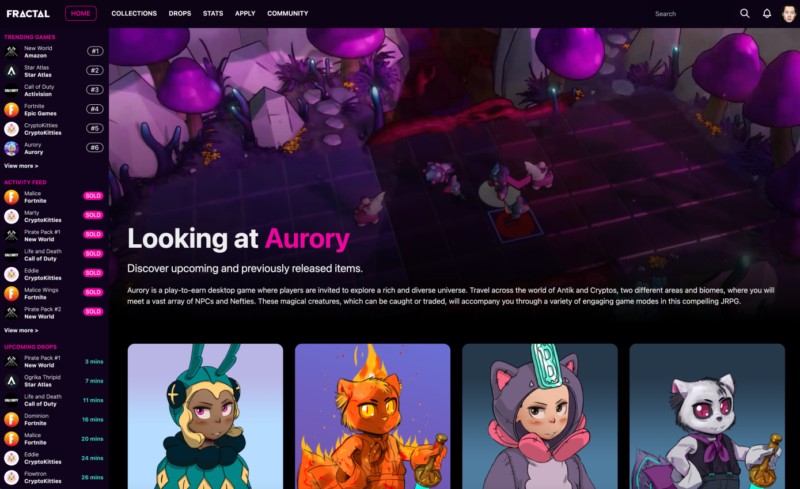In an interview with GamesBeat, Kan said that the company would focus on creating an ideal marketplace for selling gaming NFTs, which uses blockchain technology’s digital transparency and security to validate unique digital items.
NFTs emerged as a new way to monetize games this year, and we have seen the rise of many brands such as Mythical Games, Dapper Labs, Sky Mavis, Animoca Brands with high momentum.
Looking at Google Trends, you can see that NFTs started to become popular in February, followed by digital art and NFT sales like the NBA Top Shot. Dapper Labs has now seen sales of these NFTs exceed $780 million. In March, an NFT digital collage by artist Beeple was sold at Christie’s for $69.3 million. NFT sales hit $1.2 billion in the first quarter, $1.3 billion in the second quarter, and $10.7 billion in the third quarter as games like Axie Infinity rose.
Kan made the following comments about the scams;
“We’re not interested in supporting scams or people who are never going to deliver projects. There are lots of entrants, but our goal is to work with the best gaming companies out there. And there are more legit companies now who have a history of making games that are coming to this industry. And we want to work with them.”
Kan believes that good game designs will result in fairer NFT games for developers and gamers alike.
Kan said the company has partnerships with game studios that will be releasing new NFTs to the platform in the coming weeks. Players will purchase game NFTs directly from Fractal game partners and discover, buy and sell other players’ NFTs.
“Whether its starships or magical swords, or characters that are playable in NFT games, we want to be a primary and secondary marketplace. Our goal is to like be that primary and secondary marketplace for all the endgame things that developers sell before or after they launch a game.”
Today, many game companies derive a large part of their income from selling in-game items. Fractal is the first market to focus on gaming NFTs.
“I’m not particularly that interested in creating a marketplace where people are gambling on prices going up and speculating on NFTs. I think what’s really interesting is how NFTs interact with the world and how people build experiences on top of NFTs that can go beyond the game. Maybe you can craft an awesome sword and lend it out like someone renting a Ferrari for a birthday.”
Company
Fractal’s leaders include serial entrepreneurs in gaming and e-commerce. Robin Chan, head of business development and founder of XPD Media, which Zynga acquired, David Wurtz, Google Drive co-founder and consultant for Shopify, and chief technology officer Mike Angell, who previously had 20 years of e-commerce background at Fast and Shopify.

Fractal’s early partners include some of the most innovative games currently on blockchain integrations. The special NFTs they will drop into Fractal will be items that will give players abilities and experience in their upcoming games. Fractal will focus on crypto game companies that develop fun and engaging games with replayability.
“Gaming companies want to partner with us because we are industry veterans who are building for their needs. We’ve seen an influx of traditional developers who want to build a crypto experience, and we are excited to support them.”
Competitors include OpenSea, the largest NFT market with $16 billion worth of NFT transactions totaling $27 billion this year. However, Kan believes that the market will eventually split into vertical markets, and he thinks the game should have its marketplace.
“If you look at Steam, there are marketplaces for software, but the focus on gaming has existed at the same time. I think the same thing is going to happen with game assets. You’ll be able to showcase your NFTs in a different way.”
After Amazon was bred from Twitch in 2014, Kan has been investing in crypto since 2013. He is also working on decentralized projects like Theta and Audius.
Future
Kan made the following comments about the future of the game ecosystem;
“Putting these durable in-game assets on a blockchain is the next step in gaming. While players have recognized the value of items in centralized games for a long time, when game companies create lasting durability beyond their games by making their in-game assets NFTs on a blockchain, tremendous amounts of value will be unlocked for players and the gaming ecosystems themselves.”
Justin Kan, who said that his previous venture, the law firm Atrium, raised too much money very early on, and it became a problem, said that this time, the founders put their own money into the company and initially focused on getting a good product.
Web 3 and decentralization
Kan said that decentralization would put ownership in the hands of the people who make up your market.
“The building of the decentralized Web 3 feels like the building of the web years ago, It felt very exciting building Justin.TV and then Twitch, like anything was possible. It matured and became a lot of big companies. I think with Web 3 we’re back to people creating new experiences that are exciting. Decentralization will put ownership in the hands of people that make your marketplace. I think it is a really powerful idea. These big companies own the entire experience, and they’re able to rent the digital items for a pretty substantial fee. There is a lot of control they exert over the marketplace and a lot of fees they can charge customers. The way the web is supposed to work is communal ownership and a free exchange of ideas. That’s the future I want to live in.”





